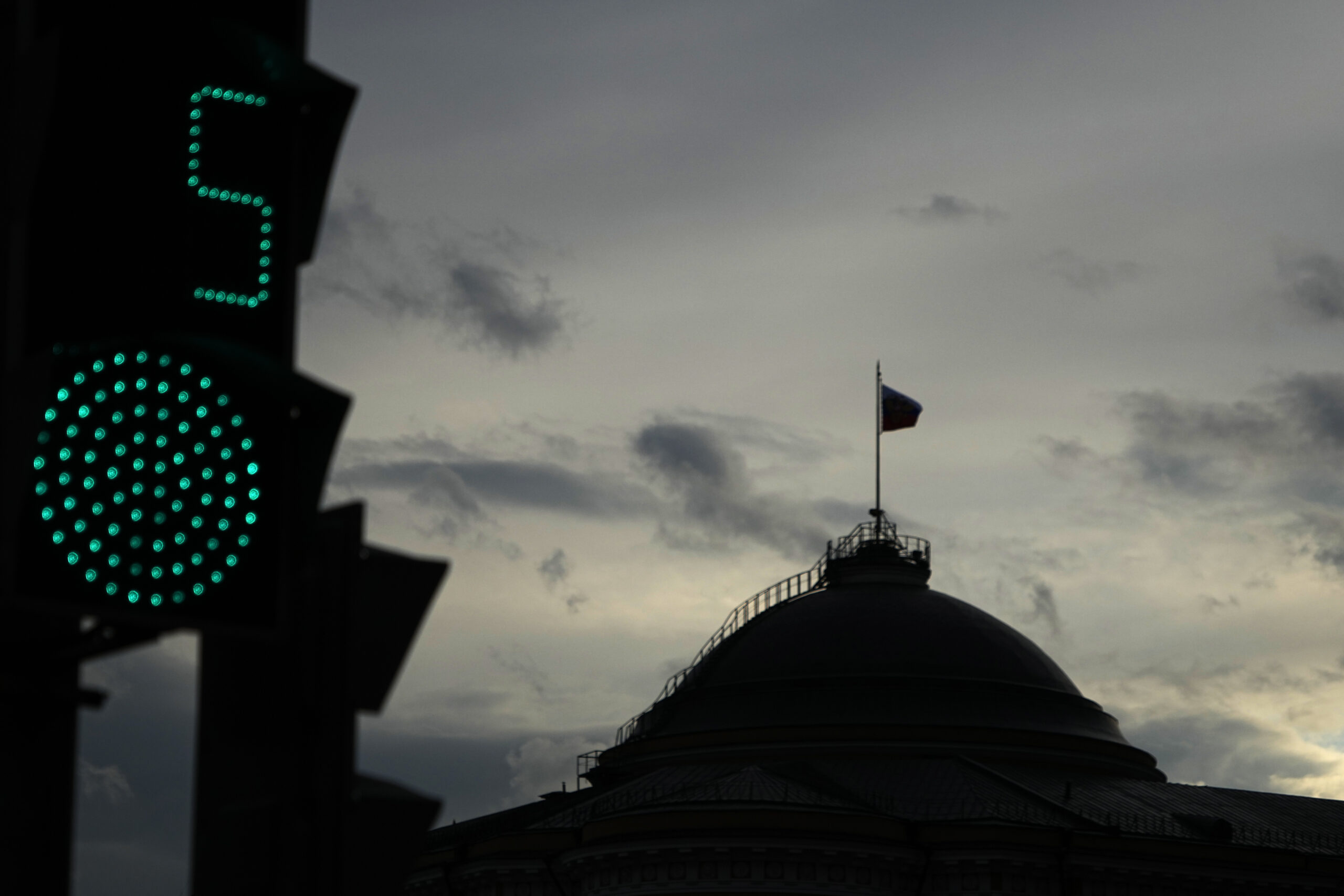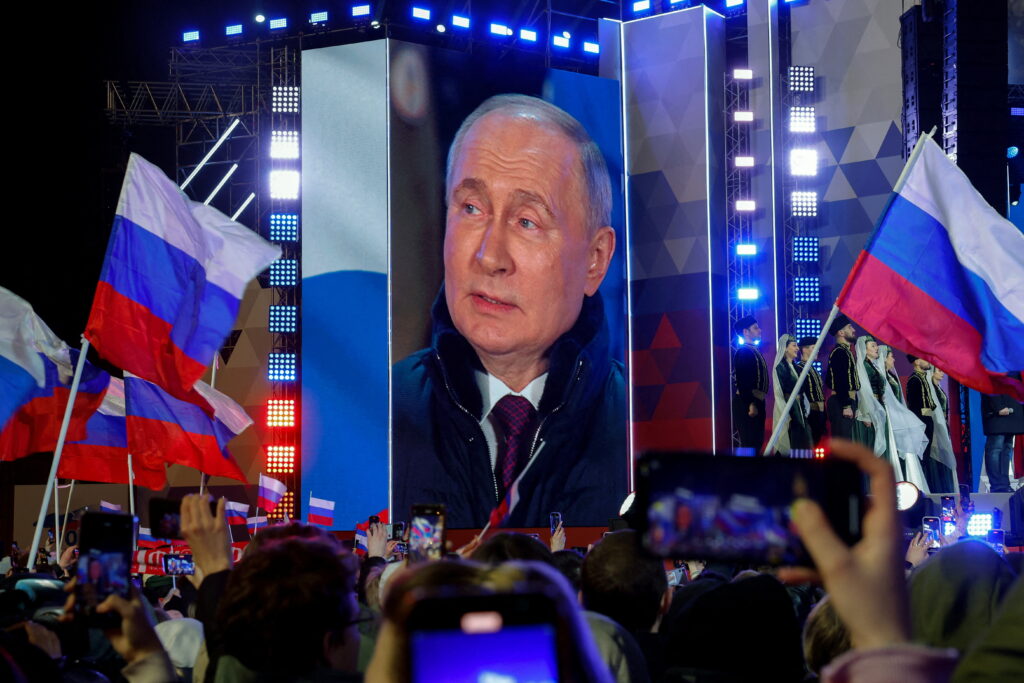Prigozhin’s recent mutiny showed that the challenge to Putin’s regime may come from his own helpers. However, predictions regarding the regime’s imminent end that mushroomed soon after the mutiny fail to recognise the fact that the Kremlin has dealt with this threat quite successfully, and the main pillars of Putin’s dictatorship, i.e. the loyalty of the power elites and the majority of the society, have not been undermined. The regime still has a large margin of stability. The fight against it should unite rather than divide the opposition movement.
Russia’s political regime: Sources of stability
Personalist dictatorships, such as the Putin’s regime, tend to last a long time: the longer a dictator holds onto power (provided that he distributes private benefits to the elites who support him), the higher the rate of loyalty. For the elites within Putin’s ‘winning coalition‘, especially the siloviki, Putin is the guarantor of their privileges, their sources of income inside the country, and their immunity from any legal prosecution. At present, the costs of collective action in organising a coup and the risks of subsequent uncertainty for each member of the ‘winning coalition’ outweigh the costs of maintaining the status quo.
At the level of society, the authoritarian equilibrium is maintained thanks to relative economic stability, which enables Russians, especially those employed in the public sector and those whose earnings are in one way or another connected to the government, to maintain a satisfactory standard of living and to believe that the costs of protest are higher than the costs of loyalty. Before the war, the Russian Federation was a middle-income country and it has retained its status till now. Propaganda and repression are also at the service of the regime. Propaganda is an effective mechanism to exercise authoritarian control, employing means such as persuasion and demobilisation. Repression, in turn, creates an atmosphere of fear and forces the discontented to remain silent, especially if they have something to lose.
In this context, Prigozhin’s mutiny turned out to be a surprising breach of subordination within Putin’s inner circle. Nevertheless, when assessing its consequences, it is important to note three points. Firstly, Prigozhin publicly remained loyal to Putin. Secondly, the rebellion was not supported either by the elites or by ordinary Russians. Thirdly, the regime managed to deal with the mutiny quickly, acting ‘by the book’ and with relatively little bloodshed. The subordination of the Wagner Private Military Company to the Ministry of Defence, the strengthening of the Rosgvardia and the announced increase in the salaries for law enforcement bodies can be seen as signals that the regime is in control of the situation, ready to invest in the loyalty of the repressive apparatus. As the criminal case against Prigozhin was closed, in parallel with the alienation of some of his assets, this demonstrates that Putin’s dictatorship adheres to informal rules of the game which provide that one never finishes off with ‘their own people’ and sends a signal to the elites that there is a high price to be paid for disloyalty.
Source of instability: The war
The war is the only factor currently influencing the internal political dynamics in the Russian Federation. And there is no reason to believe that Putin will stop it. Firstly, this is not in his interest. Apart from his general obsession with Ukraine, Putin apparently launched the aggression in the hope that it would help him to bolster his popularity that was shaken following the coronavirus pandemic. Indeed, while in September 2021 a total of 47% of Russians would like to see Putin as president after 2024, the corresponding figure in June 2023 rose to 68%. Putting an end to the war eight months before his next re-election is the last thing the Russian dictator would want. Secondly, Putin may believe that, even if the war does not work out in his favour, everything will change in the future: he just needs to be patient and, for example, wait until Donald Trump returns to the U.S. presidency. Thirdly, an end to the war would cast a blow to Putin’s ego. The Russian dictator is a narcissistic leader who does not know how to lose. Such politicians are not willing to end wars, even if success is not on their side, and prefer to ignore unpleasant news. A recent has shown that narcissistic leaders tend to withdraw from wars only if they ‘win’ or ameliorate threats to their image once the fighting stops.
Ukraine, for its part, is determined to fight for independence and is not ready to bear the war crimes committed against its citizens, and it also does not want to tolerate the annexation of part of its territory. A total of 84% of Ukrainians agree that one must not make territorial concessions even if the situation on the battlefield gets worse. Moreover, stopping the war at the current stage represents a security threat for Ukraine in the future: Putin will not abandon attempts to subdue Ukraine without suffering a serious military defeat. Ukraine also has the assistance from the West on its side. Firstly, public opinion is still in favour of supporting Ukraine: 65% of U.S. citizens and 76% of EU citizens. Secondly, Western politicians realise that refusal to support Ukraine would be a proof of their inability to resist aggressive dictatorships. A year ago, J. Borrell stated: «Allowing Russia to prevail would mean allowing it to destroy our democracies and the very basis of the international rules-based world order.»
The Russian army has reached its maximum capacity and is hardly capable of any military achievements. The initiative is now on the side of the Ukrainian Armed Forces. In case of a successful Ukrainian offensive, Putin will have to make a choice between accepting military setbacks or resisting. There is no doubt that Putin will not concede. In this case, he will have two choices: declare a new mobilisation or apply nuclear terror. The latter option is disadvantageous to everyone in equal measure. Ukraine will be the target of this terror, and the West will have to respond to Russia’s violation of the ‘nuclear taboo’ since failure to respond will likely lead to uncontrolled proliferation of nuclear weapons and the collapse of the entire international security architecture. At the same time, if the Russian army enters into a conflict with NATO, it is likely to suffer a military defeat. In this scenario, the collapse of the regime is inevitable. At the same time, the risk of uncontrolled nuclear escalation will be extremely high. The West is well aware of that.
Regardless of whether Putin is willing to use nuclear weapons or not, a new mobilisation would be his next step on the escalation ladder in the event of military failure. Putin does not want a new mobilisation because it entails risks for his regime. Firstly, it increases the likelihood of mass protests, undermining the value of the status quo to citizens. Secondly, even if mobilisation does not trigger mass protests (or if the authorities manage to suppress them), mobilisation is another step towards the politicisation of the people. Growing politicisation, in turn, offers an opportunity for the opposition to reach new audiences. For example, politicisation of the population in the GDR in 1989 connected with the migration crisis led to the collapse of the seemingly unshakable communist regime. The heavy losses of the Russian army may also trigger disloyalty among the Russian troops on the frontline, especially that discontent in the army has already been reported.
After the war
Neither the West nor Ukraine would like to see a de facto end to the war when part of Ukrainian territory remains under Russian occupation. However, this scenario is possible and, moreover, highly likely. In the second option, Ukraine would recover the occupied territories, and Putin would accept this outcome without resorting to nuclear terror.
The first scenario is mostly favourable for Putin, as he will be able to ‘save face’ by presenting the occupied Ukrainian territories as the ‘achieved goals of the special military operation’. The second scenario is favourable for Ukraine. However, even in this case, Putin is more likely to retain than to lose power, although, of course, uncertainty will be higher. Even a weakened dictator would be more preferable for the elites than any change in the status quo. In both scenarios, the survival of the regime will depend on Putin’s ability to guarantee the same level of benefits for the elites and to contain citizens’ discontent, since their ‘size of the pie’ will only shrink.
If the Russian Federation manages to avoid a war with NATO and, consequently, a resounding military defeat, not to mention more tragic outcomes, Putin is likely to retain his power until natural death. If that happens, his death will not change the nature of the regime, which will remain authoritarian. The main positions inside the country will continue to be held by the siloviki, i.e. people involved in war crimes in Ukraine and human rights violations in the Russian Federation, who have competences that are not needed in any fairly open society. Liberalisation can trigger the process of democratic transformation, which will not only be disadvantageous to these power elites, but may cause them to lose their freedom.
Since the siloviki hold a central place in Putin’s ‘winning coalition’, they will have the de facto power once the dictator dies. If the siloviki decide to rule on their own, this will lead to political instability, as there will be a question of whether or not there is a single source of subordination for all power groups. Whoever becomes the leader, their authority is unlikely to remain unchallenged. In this situation, there is a high risk of open conflicts within the siloviki-based ruling elites. It is hard to imagine how these conflicts may develop, but the scenario involving a collapse of the main functions of the state (such as ensuring security, distribution of economic resources between different parts of the country and sectors of the economy, etc.) is quite likely.
Formal power, however, may end up in the hands of technocrats. This is possible if the current version of the Constitution remains in place upon Putin’s death, the siloviki agree to transfer the power to the prime minister (whoever this might be), and choose a technocrat figure for the presidential ‘election’, expecting to be able to control his actions in the future. In this scenario, the ‘technocratic president’ will have to rely on a coalition of siloviki, if such a coalition is formed, or to balance among various groups of the bloc of security forces. Neither restoration of relations with the West nor negotiations with the opposition will be possible in this scenario. In the liberalisation scenario, the siloviki run the risk of losing not only their influence and property, but also their freedom, since they will have to be liable for war crimes in Ukraine and human rights violations in Russia. The equilibrium in this scenario is also unstable. At the same time, in the long term, an opening of the regime is possible in this scenario if the balance among the elites is preserved and the civilian bureaucracy gradually establishes control over the siloviki.
What should the opposition do?
Russia’s opposition forces are in a difficult position: they are heterogeneous, outlawed, and pushed out of the country. Before the war, the opposition was deprived of formal recognition and political representation and, consequently, it has limited legitimacy. The political organisations which have remained in the country are not the opposition. The only exceptions are a handful of activists and a small number of MPs at regional and local levels.
If Russia does not suffer a military defeat, and if mass protests are successful (when the regime is not able to stifle them either by force or through concessions), the opposition will have no opportunity to participate in the life of the country directly. Under such conditions, the opposition should avoid internal conflicts, and it should engage in politicisation of Russian citizens, support political prisoners as well as opponents of the war (both activists inside the country and Russians who have emigrated), cooperate with political forces in other countries as well as international organisations.
Political conflicts are a source of emotional polarisation. Emotional polarisation represents a barrier to collective action, whether at present or in the future. Therefore, Russian opposition groups must demonstrate their willingness to cooperate and enter into dialogue with one another. And there are prerequisites for this: predominantly the rejection of the war and shared experience of repression. Mutual tolerance is also a precondition for a successful transition, when and if the circumstances permit it. Indeed, Putin’s regime has done much to radicalise the Russian opposition by systematically denying its recognition, preventing it from running in elections, and persecuting activists. However, politics is not a zero-sum game: in fact, it is the art of compromise on the way to achieving common goals. It is high time everyone started mastering this art.
In the absence of a military defeat, threats to Putin’s regime can only come from Russian citizens. It is important for the opposition forces to politicise the people by undermining public support for the regime, to find ways to reach groups beyond its current target audience, to try and communicate with both supporters of the war and sceptics. In this regard, Navalny’s team’s initiative called the Anti-War Campaign, may bear fruit. Research has shown that confrontation with opposing views makes people realise that not everyone thinks alike.
Offering help to political prisoners, anti-war activists inside the Russian Federation and Russians who have left the country will enable the opposition not only to preserve, maintain and strengthen its ties with the core supporting forces, but also to work together towards the goals shared by all opposition groups. The marathon in support of political prisoners is a recent successful example. The experience of joint action also helps to eliminate mutual distrust and resentment.
By cooperating with political forces in other countries, as well as with international organisations, the opposition can push for new restrictive measures against Putin’s regime. Moreover, by interacting with elites in other countries, the Russian opposition can gain leverage to influence decision-making in the interests of its supporters, such as those who have left Russia. Finally, it is important for the opposition to earn a reputation in the West. Western financial assistance and advisory support will be needed when and if circumstances arise in the Russian Federation to build and support democratic institutions.
Conclusion
This assessment of the potential developments within the political regime under Putin and its transformation after his departure is based on what is known about the sources of stability of the system he has built and how the system has managed to overcome political challenges in the past.
Other things being equal, Putin’s dictatorship is now not threatened by either a coup or a protest. However, the war of aggression against Ukraine is a constant source of uncertainty that could undermine the status quo at any moment. A resolution of the war in Putin’s favour could fossilise the regime until the dictator dies. However, even an outcome which is negative for the Kremlin will not necessarily lead to the collapse of the regime.
One way or another, the threats to Putin’s regime can only come from Russian citizens: deteriorating living conditions can topple the equilibrium within the country, elevating the costs of maintaining the status quo above the costs of protest. However, the people need to be politicised and this is the task for the Russian opposition groups. They can do it together. They can do it in parallel. The main thing is to avoid conflicts.










